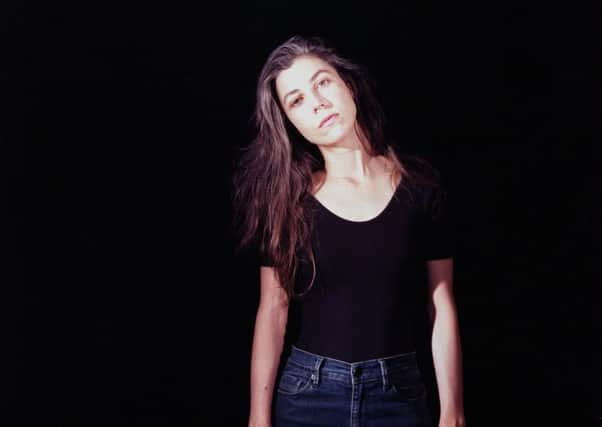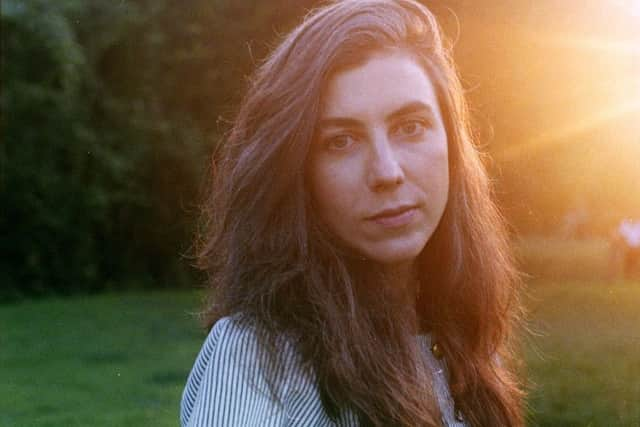Julia Holter: '˜I enjoy the way that this record is kind of chaotic'


“It’s in a way easier to have more people because it’s like filling out the parts,” says the 33-year-old of the five-piece ensemble who are accompanying her. “Most of them are people who are on the record so it’s really fun and I have the parts already because we rehearsed before we recorded the record, so it’s actually been easier in a weird way than in the past.
“It frees me up more too when there’s more people doing stuff, so in a way it’s an exciting privilege to have this many people. It’s six of us, including me.”
Advertisement
Hide AdAdvertisement
Hide AdAviary was released critical plaudits in October but Holter began work on the record two years earlier, amid the US presidential campaign. Its title comes from the line “I found myself in an aviary of shrieking birds” by the Lebanese-American poet Etel Adnan.


“It’s just a kind of general feeling that’s related to the way that people communicate these days, like the internet and smartphones and Twitter and other stuff,” says Holter. “Just the noise of that and what it does to a person. It’s different than in the past.
“I think communication is hard for me personally. I get communication overload as a person easily. I will forget what I’m saying because there’s something else going on.
“There’s something in particular with 2016 because of our president in the US. It’s not just him though, everything is supposed to be exciting and every day there’s news that’s scandalous or something he said, he’s a PR for himself. So there’s this type of mentality of that’s the person who’s supposed to be our president. It’s not just him, there’s a lot of other things that started way before. I guess this is my response to that.”
Advertisement
Hide AdAdvertisement
Hide AdThe image of shrieking birds also represents something internal for Holter too. “That boundary between external and internal to me makes me think of biology, when in osmosis they start talking about it’s like diffusion of water. If there’s a concentration of water it will always permeate the cells. It’s sort of like the internal chaos is partially because of the external, so to me the birds from the external are going through this semi-permeable membrane of your mind and flying around. They’re all related, right?” she chuckles, appreciating the tangled metaphor.
Where the singer songwriter’s previous album, Have You in my Wilderness, adhered to fairly traditional baroque-pop forms, Aviary is far more free-roaming and experimental. “Yes, I do enjoy the way that this record is kind of chaotic,” Holter says. “It’s an extreme maybe but for me the last record was like a particular project. In Have You in my Wilderness I wanted to make songs that were in the tradition of ballads or pop songs, more so than I have done in the past, and explore that a little bit, and also not do playing around with texts, borrowing them and making them into my own song. I wanted to have more like verse-chorus-verse repetitions, that was a conscious effort that was inspired by some older songs of mine like Betsy On The Roof, Sea Calls Me Home and Have You in my Wilderness, and I wanted to make a record around those songs. So it was like a project for me in that way. It was also very emotional but for me but it was like a specific thing.
“This record involved a lot of things I’ve been working on for 10 years. A lot of things I’ve been thinking about like memory, medieval imagery and how memory functions in writing. I guess it’s something that I do a lot more this record than Wilderness. It’s not that simple, but that’s a way to look at it. It wasn’t easy to make this record but it was freeing and very fun. I wanted to make a very playful record.”
The songs embrace everything from the poetry of Sappho to the sci-fi noir of Bladerunner. Holter says juxtaposing ideas is “just how I write”. “There’s a song called Colligere and it means to collect, to gather, that to me is how I make my things sometimes, to collect stuff from a lot of different places or times. I didn’t consciously think of that in the past but I’m starting to understand myself. A lot of times it’s stuff I don’t necessarily understand or know a lot about, I’m not a scholar; it’s just some impulse that I think comes to a lot of people. In general I think a lot of art as this constant translation, in a way, collections of things. It’s not that I think I am a genius that combines all of the past into the present; for me that’s just how things are. A lot of things are from the past and are recycled in some way.”
Advertisement
Hide AdAdvertisement
Hide AdThe album ends with songs about love and forgiveness. “Why Sad Song, the last song on the record, is a track I recorded 10 years ago. The other older song is I Would Rather See. Why Sad Song is a phonetic translation of this older song, Kyema Mimin by Choying Drolma. I basically took the sound of the words and put them into English, something I used to do a lot. Basically it’s a cover of a song with different words. When I did that I was surprised to learn that ‘keyma’ means sadness and that’s the name of the original song. To me that’s really cool.
“I don’t believe that music is a universal language but I think there’s something wonderful that happens when you start to use sound to then reveal meaning, with sound coming first. On a really basic level whey I brought this song onto the record was because I thought it was a calming song. The record is so intense so this was a conscious choice because I felt it needed something kind of meditative, self-reflective, self-critical, not in a harsh way but just ‘I am human, I am fallible’. It’s a self-reflective song and one of humility, it’s very soothing and felt for me like a loving song in a different way than I Shall Love, a positive, sharing thing.”
Holter has latterly ventured into composing for film and television. She says: “I think it’s wonderful and freeing. I love to have no ego. They’ll say ‘Change everything’ and I’ll be like ‘sure, no problem’. I care that they like it and I care that I like what I’m doing but when you make your own music this inner criticism is so painful and difficult, like you’re constantly hating yourself. I think that’s how a lot of people are with their work. It’s not easy to do scoring for other reasons, like you can’t read people’s minds, there are communication barriers, but my experiences have been very positive. I’ve worked with very nice people, so I’m lucky, I guess. I’m hoping to do it a lot more, I really love it.”
Julia Holter plays at Howard Assembly Room, Leeds on December 11. juliaholter.com